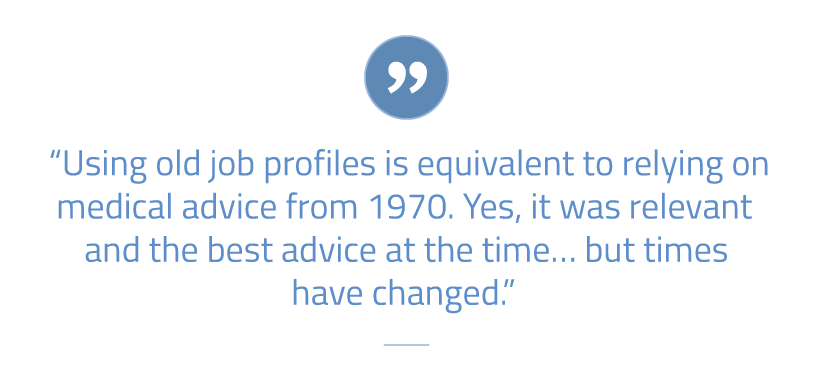Talent assessment should be a strategic tool that drives positive, measurable outcomes
With CEOs paying more attention to both people and metrics, a data-driven talent assessment strategy should be a no-brainer in an organization’s hiring process.
However, for many executives, a talent assessment strategy is an afterthought, and is almost never considered a strategic tool that can have a measured, positive impact on a business.
4 benefits of taking your Talent assessment strategy from an afterthought to a strategic tool
Want to get executive buy-in for implementing pre-hire or internal mobility assessments? Include these 4 large-scale benefits to strategically using assessments to inform your talent decisions.
1. Assessments Embed a Realistic Job Preview into the Hiring Process
Raise your hand if you’ve recruited a candidate, taken the time to get them through the hiring process, trained them for 20 days, then gotten them on the floor only to have them to quit a week later, telling you that they had no idea the job was “like this.”
Learn how to measure contact center skills using multimedia simulations.
You would be surprised at how often I hear this. An assessment company that develops multimedia job simulations can completely strike this issue. By using a multimedia job simulation as part of the hiring process (think: gamification), your candidate gets a realistic job preview while your company is provided with highly accurate data regarding the candidate’s skills, abilities, and motivations.
Want to know how they will do typing and listing to a customer at the same time?
Check.
Want to know how well they will be able to navigate the computer systems and tabs?
Check.
You can’t measure these skills with an in-person interview. You can, however, measure them accurately with a job simulation.
2. Pre-Hire Assessments are Better than Interviews
If your company relies exclusively on a traditional in-person interview process, checking mental boxes as the applicant answers the same old questions, it’s probably time for a change. Research shows interviews alone aren’t an accurate way to get a grasp of the candidate’s skills and abilities. You know there’s probably a more effective way of determining who the best fit is, and you’re right.
The data generated in the assessment process provides real information to discuss with the candidates. The assessment will tell you what their strengths are, as well as areas where they can improve. Use this information to create a meaningful interview. If the assessment has identified that the candidate might struggle working with a team, discuss that in the interview!
3. Talent Assessment Software Helps You Discover Skills and Knowledge Gaps
In addition to being a great interviewing guide, the results provided by talent assessment software can help the business identify which hires will need training in specific areas. This knowledge can be used to develop an ongoing training program designed to give candidates practice in the areas they need it most, straight from day one.

4. Talent Selection Tools Allow You to be a Cheetah, Not a Sloth
Most companies don’t have data to understand exactly where their hiring and retention problems are coming from. Is it that our sales training is bad, or are we not identifying high-quality candidates in the hiring process? Are we losing people because of our pay, or are we losing people who aren’t a good fit in the first place?
It gets this bad because of lack of oversight and course correction.
Many of our customers built job profiles for the job months, or even years ago. It’s equivalent to relying on medical advice from 1970. Yes, it was relevant and the best advice at the time, but times have changed.
In cases like this, an assessment company that has a strong analytics program can be a game-changer. Many of our customers are able to use real data – their data – to create a month-over-month view on what is going on within the business. This view allows organizations to see how assessments are impacting job performance real time. Both the business and the assessment company can have frequent discussions to identify areas of needed improvement and do so quickly.
It’s important to note here that not all assessment companies are created equal. Many assessment companies rely on annual reviews, or wait until contract renewal to see how assessments are performing. You should never hire on a profile that was outdated six months ago.
Assessments should be adjusted post-implementation to accommodate:
- Adjusted hiring volumes
- Changes in the labor market
- New metrics or qualities required for the position
- A change in business objectives
An old profile can cause major issues for a business and lead you into more trouble than you had in the first place. By adapting to change quickly, you can steer the ship in a different direction when needed, and do so before you hit the iceberg – not after.
The Best Way to Get the Buy-In? Get Executives Involved Early.
Get your executives involved early in the process by including them in conversations with the assessment companies. If you already have an assessment process that your team is reluctant to change, gather data on why it’s not working and compare that data to these nine points. Ultimately, if your assessment vendor does not approach you about making improvements before you complain, that’s an issue.
Communicating the advantages of a talent assessment strategy with your team can help you get the funding you need for an assessment project, and make you look like a real rock star in the process!
Ready to get started? Our team is here to help. Learn more about how we work with organizations to build measurable, data-driven strategies by speaking with one of our talent acquisition specialists.


